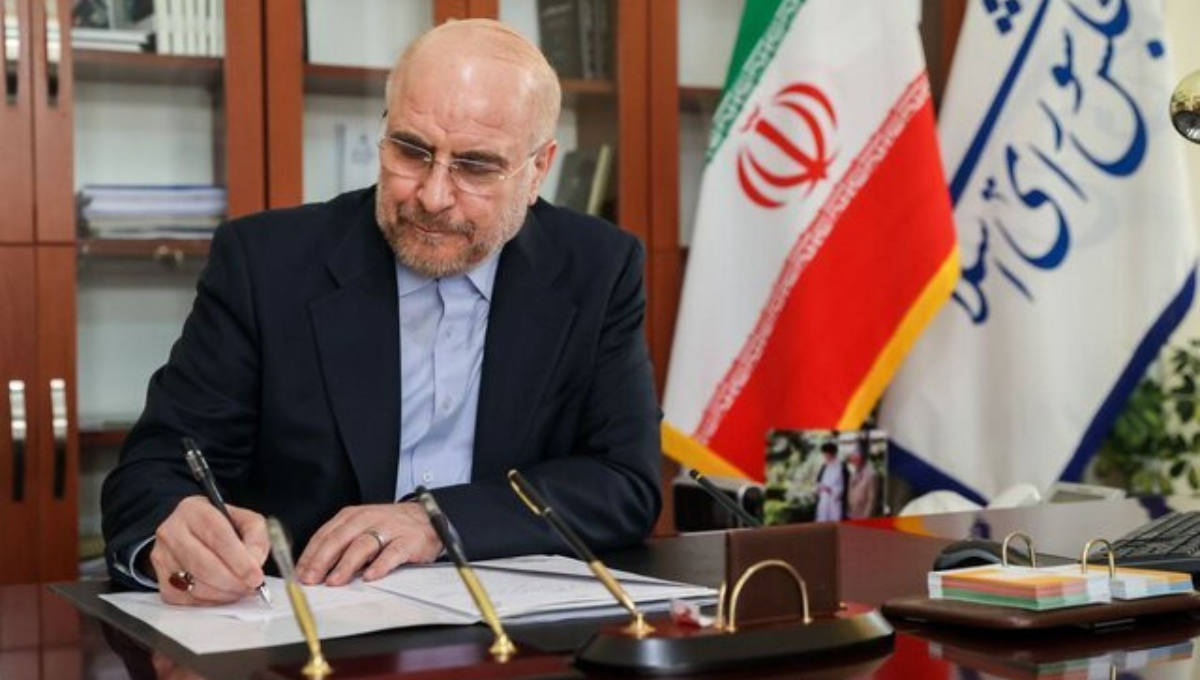Mohammad Bagher Ghalibaf, Speaker of Iran’s Parliament, has formally forwarded to President Masoud Pezeshkian the bill approving Iran’s conditional accession to the International Convention for the Suppression of the Financing of Terrorism (CFT). This crucial step for Iran’s anti-money laundering and counter-terrorism financing framework was carried out under Article 123 of the Iranian Constitution, which mandates that the parliamentary speaker send approved legislation to the president for implementation.
The Expediency Discernment Council of Iran had previously approved Iran’s entry into the CFT on specific conditions in its plenary meetings held earlier this month. Mohsen Dehnavi, the council’s spokesperson, clarified that Iran will comply with the CFT’s provisions while ensuring they conform strictly within the framework of Iran’s Constitution and national laws. The Council made it clear that should any part of the international convention conflict with Iran’s domestic laws, Iran’s internal laws will prevail. This dual-condition approach was pivotal for the council’s endorsement.
The CFT is part of a broader global effort spearheaded by the Financial Action Task Force (FATF) to combat the financing of terrorism. Iran’s accession to this convention aligns with its legal reforms aimed at uprooting illicit financial flows linked to terrorist entities. Tehran’s formal commitment to join the CFT regime comes amid ongoing scrutiny from international watchdogs and global political pressures, including sanctions and diplomatic isolation.
Iran’s move to join the CFT also follows the Expediency Council’s prior conditional approval of Iran’s accession to the Palermo Convention, another critical anti-crime treaty aimed at combating transnational organized crime and money laundering. FATF had set these two steps—acceding to the Palermo and CFT conventions—as key requirements for Iran’s possible removal from its blacklist.
The legislative process reflects the tension between Iran’s external diplomatic obligations and its internal political and constitutional framework. While Iran seeks to normalize relations with global financial systems and ease the impact of countermeasures, significant factions within Iran remain cautious about full transparency. They fear that adopting international financial regulations could expose Iran to greater foreign scrutiny and hinder its ability to support regional allies.
Mohammad Bagher Ghalibaf emphasized that parliamentary discussions had clearly stipulated that Iran’s implementation of the CFT would be consistent with constitutional principles. This stance seeks to reassure domestic stakeholders that while Iran cooperates with international standards, it will not compromise its sovereignty or constitutional norms.
The Iranian government’s next step will be the official enactment of the bill, which will activate Iran’s legal accession to the CFT. This will enable Iran to engage more constructively with international bodies working on anti-money laundering and counter-terrorism finance issues, potentially paving the way for dialogues aimed at lifting certain sanctions that have isolated the country economically and financially for years.
The ratification of the CFT by Iran is expected to have broad implications for regional and global security frameworks. By formalizing legal measures to investigate, deter, and prevent the financing of terrorist activities, Iran signals a partial alignment with international anti-terror finance commitments, although under strict conditions reflective of its national interests.
Iran’s incremental steps toward compliance with the FATF framework, despite considerable internal political debate, suggest a pragmatic approach aimed at balancing international engagement with constitutional safeguards. Observers note that these changes come amid heightened geopolitical challenges and the re-imposition of U.N. and EU sanctions, underlining the delicate position Iran occupies.
In summary, the forwarding of the CFT bill by Iran’s parliamentary speaker marks a critical juncture in the country’s legal and regulatory landscape of anti-money laundering and counter-terrorism financing. With careful caveats protecting domestic laws, Iran’s conditional accession to this international convention seeks to open a new chapter of financial compliance while navigating complex political realities at home and abroad.
This development will be closely monitored by international watchdogs, financial institutions, and diplomatic entities as Iran attempts to reconcile global expectations with its sovereign prerogatives in the fight against illicit financial activities linked to terrorism.


